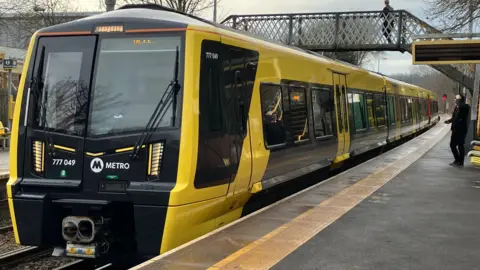Winter rail chaos could happen again, report warns
 Andy Gill/BBC
Andy Gill/BBCThe reasons why a rail network ground to a halt in icy weather earlier this year have been made public.
The "unprecedented" winter failures happened on Merseyrail services on 9 January and a report has warned they could happen again if changes aren't made immediately.
Services were completely suspended for several hours that morning following light snowfall, leaving passengers stranded, with one train stuck for two hours with passengers on board without access to toilets or water.
In a joint statement responding to the report, Merseyrail, Network Rail and Stadler said they were committed to ensuring that a plan for winter resilience going forward was "the best it could possibly be".
The author of the report, Vernon Everitt, Greater Manchester's transport commissioner, said the network's winter weather resilience plan did not work because two factors had not been taken into account.
The first was that this was the first winter with an entirely new fleet of trains and Merseyrail's winter weather plan was outdated – it did not take into account that the new trains respond to ice in a different way to the old trains.
The second factor was that a new anti-icing product was being used which had not been tested against snow on the Merseyrail network.
Mr Everitt warned that if there were no changes, the same collapse of the network could happen again this coming winter and said he had set a deadline of June 2025 for adaptations to be made.
He said the root cause of issues was ice on the third rail which provided power to the new trains.
"You have to keep the third rail clear so the train can draw power to move," he added.
The report explained that old trains "sheered off" ice from the third rail, whereas when the new trains came into contact with ice they "lifted up", no longer making contact with the third rail, and therefore came to a stop.
Mr Everitt said assumptions had been made in the winter plan put together by the rail partners Merseyrail and Network Rail that the new trains would operate in a similar way to the old ones in scraping the ice away.
The new anti-icing agent had been used the year before in what Mr Everitt described as a "relatively mild" winter. "It hadn't really been tested against snow," he added.
He said: "You will never eliminate all risk of this because third rails are inherently open. You can get to the conditions where ice does form, but you need the anti-icer and the train working in harmony to minimise that risk to the lowest possible level, and you need to start work on that now."
'Two hours is too long'
Mr Everitt said another problem was that there needed to be single person with oversight of the whole system and suggested the Liverpool City Region should take responsibility for appointing somebody with accountability for plans moving forward.
He also called on train operators to adapt the units to be able to scrape ice off the rails and apply anti-icer as they go.
One of the most serious impacts on passengers in January was on those who were stranded on the train at Old Roan.
Mr Everitt said: "Two hours is too long for anyone to endure," and that thought needed to be given to people who might be travelling with small children, or passengers with disabilities.
His report also found that passengers inconvenienced by the delays had received "inadequate" communication regarding compensation and refunds. He said in future, compensation information should be more actively advertised.
He praised the efforts of frontline staff who had responded on the day, and said that Merseyrail was a very well run network with a reliable service, and good customer satisfaction. He said: "Many of us round the country wish we had a railway like it".
 PA Media
PA MediaWhen asked why the issue of cold weather resilience did not seem to have been anticipated when the trains were ordered in 2016, he said that "back then, things like ice scraping wasn't specified because that was regarded as being the responsibility of Network Rail who look after the tracks, and it goes to show the fragmentation there is across the rail network".
Metro Mayor Steve Rotheram repeated his apology to customers for the problems in January and said plans on how to ensure the network could cope in winter would be made public, with all partners "willing" to address the issues.
In a joint statement, Merseyrail, Stadler and Network Rail said: "We welcome the findings of the review of the disruption on the 9th January 2025. As the report makes clear, Merseyrail is a well-managed and high performing network.
"It's right therefore that when things don't go to plan that we review and learn from them. Merseyrail, Network Rail and Stadler are committed to working closely with the Liverpool City Region Combined Authority, to ensure that the plan for winter resilience is the best it can possibly be."
Listen to the best of BBC Radio Merseyside on Sounds and follow BBC Merseyside on Facebook, X, and Instagram and watch BBC North West Tonight on BBC iPlayer. You can also send story ideas via Whatsapp to 0808 100 2230.
